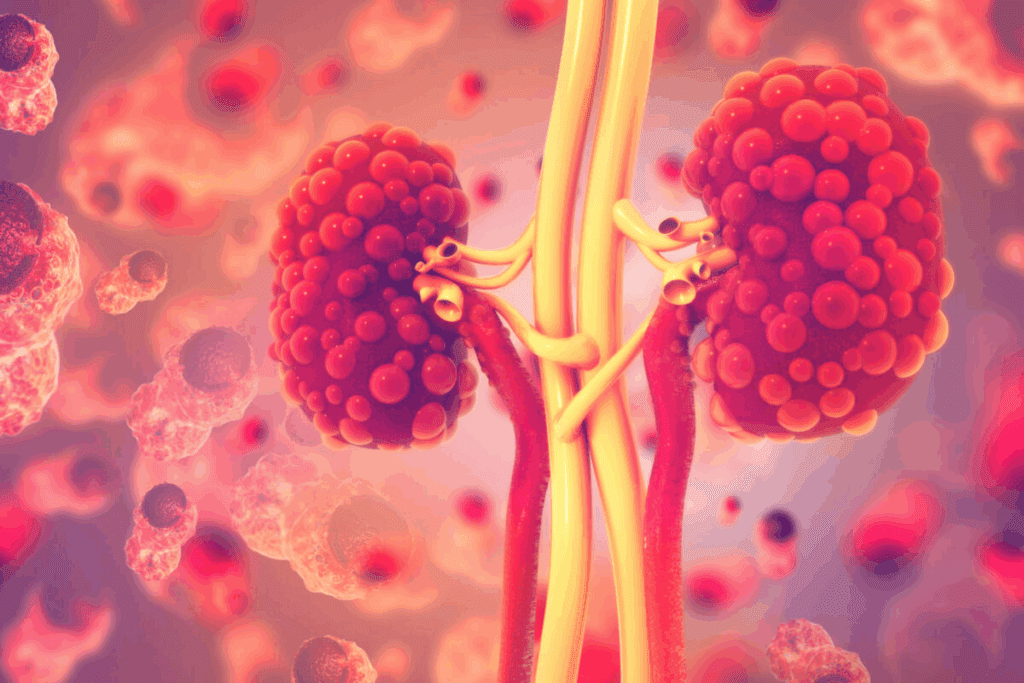
Calcium phosphate kidney stones are a big problem for many people around the world. At Liv Hospital, we know how important it is to find these stones early and give each patient the right care.
These stones are different because they form in alkaline urine. They can grow fast and cause a lot of damage to the kidneys if not treated. Conditions like hyperparathyroidism and renal tubular acidosis can lead to these stones.
We know these stones are less common but more serious. It’s very important to understand their causes and how to prevent them.
Key Takeaways
Understanding Calcium Phosphate Kidney Stones

Calcium phosphate kidney stones form from many factors. They are less common than calcium oxalate stones. Yet, they are linked to certain health conditions, making them important to understand.
Composition and Formation Process
These stones are made mainly of calcium phosphate salts, like hydroxyapatite. They often form when urine is too alkaline. This makes it easier for calcium phosphate to crystallize.
Key factors contributing to their formation include:
Experts say, “An alkaline urine environment is key in forming calcium phosphate stones.”
“An alkaline urine pH greatly increases the risk of calcium phosphate stone formation. This is because it promotes the crystallization of calcium phosphate salts.”
Prevalence and Risk Factors
Calcium phosphate stones are less common than calcium oxalate stones. They make up a smaller part of all kidney stone cases. Yet, they are linked to specific risk factors.
Knowing these risk factors helps us find who’s at higher risk. It also helps us take steps to prevent them. We need to consider these factors when looking at patients with kidney stone history.
By understanding calcium phosphate kidney stones, healthcare providers can create better prevention and treatment plans.
How Calcium Phosphate Stones Differ from Other Kidney Stones

Calcium phosphate kidney stones are unique compared to other types. They differ mainly in their composition and how they form.
Comparison with Calcium Oxalate Stones
Calcium phosphate stones are often compared to calcium oxalate stones. Both are common, but they form differently. Calcium oxalate stones are more common and linked to diet. On the other hand, calcium phosphate stones are often related to metabolic disorders and infections.
The presence of phosphate in calcium phosphate stones can lead to a more alkaline urine pH, which in turn can promote the formation of these stones.
These stones are also smoother and more uniform than calcium oxalate stones. This difference can affect symptoms and complications.
Growth Patterns and Severity
Calcium phosphate stones can grow faster and larger than other stones. This can lead to more severe problems. Their growth is often linked to metabolic issues like renal tubular acidosis or hyperparathyroidism.
These conditions increase calcium and phosphate in urine, making stones more likely to form.
The severity of these stones also depends on their impact on the kidneys. As they grow, they can block the urinary tract. This can cause infections and scarring. So, it’s important to understand the differences to prevent and treat them effectively.
We also need to look at the role of electrolytes like potassium in stone formation. Studies show that potassium citrate can prevent stones. It does this by reducing calcium in urine and increasing citrate, which stops calcium stones from growing.
The Role of Alkaline Urine in Stone Formation
Alkaline urine is a major factor in calcium phosphate kidney stones. The pH of urine affects how likely stones are to form.
Understanding Urine pH Levels
Urine pH shows if it’s acidic or alkaline. A pH above 7 is alkaline, below 7 is acidic. Urine usually stays slightly acidic to neutral.
We’ll see how urine pH affects kidney stones. An alkaline environment raises the risk of calcium phosphate stones. This is because calcium phosphate crystals form more easily in alkaline conditions.
How Alkaline Urine Promotes Calcium Phosphate Crystallization
In alkaline urine, phosphate ions are more concentrated. This makes calcium phosphate crystals more likely to form. This is key in creating calcium phosphate kidney stones.
Diet and medical conditions can change urine pH. For example, sodium bicarbonate can raise pH and increase stone risk. Conditions like renal tubular acidosis also make urine more alkaline.
Knowing how urine pH affects stones is important. Keeping an eye on urine pH can help prevent calcium phosphate stones.
Electrolytes like potassium also play a role. While potassium doesn’t directly cause stones, its balance can affect urine pH and stone risk.
In summary, alkaline urine is a big factor in calcium phosphate kidney stones. By managing urine pH, we can lower this risk.
What Causes Calcium Phosphate Kidney Stones: Primary Factors
Calcium phosphate kidney stones form due to many factors. Knowing these causes helps in preventing and treating them.
Metabolic Abnormalities
Metabolic issues are key in making calcium phosphate kidney stones. Hyperparathyroidism and renal tubular acidosis raise the risk. Hyperparathyroidism makes too much parathyroid hormone, upsetting calcium levels.
Renal tubular acidosis messes with acid-base balance in the kidneys. This makes the urine too alkaline, helping calcium phosphate stones form.
Dietary Influences
What we eat also affects our risk of kidney stones. Eating a lot of animal protein and sodium raises urine calcium levels. This increases stone risk. But, eating potassium-rich foods can balance urine and lower risk.
| Dietary Factor | Effect on Calcium Phosphate Stone Formation |
| High Animal Protein Intake | Increases urinary calcium excretion, promoting stone formation |
| High Sodium Intake | Enhances calcium excretion, increasing stone risk |
| Potassium-Rich Foods | Helps balance urinary pH, reducing stone risk |
It’s important to understand how diet and metabolism work together for kidney stones. By focusing on these areas, doctors can create better prevention and treatment plans.
Renal Tubular Acidosis as a Major Cause
Renal tubular acidosis (RTA) is a major cause of calcium phosphate kidney stones. It affects the kidneys’ ability to balance acid and base levels. RTA makes it hard for the kidneys to acidify urine, causing too much acid in the body.
Types of Renal Tubular Acidosis
There are several types of RTA, each with its own cause. Distal RTA (Type 1) is the most common and linked to kidney stones. It stops the distal tubules from removing hydrogen ions, making urine too alkaline for calcium phosphate stones.
Using certain diuretics can make this problem worse. They can raise calcium levels in urine, increasing the risk of stones.
Proximal RTA (Type 2) affects the proximal tubules’ ability to reabsorb bicarbonate. This leads to bicarbonate loss and metabolic acidosis. While it can contribute to stones, its effect is less direct than distal RTA.
Mechanisms Leading to Stone Formation
RTA causes calcium phosphate stones in several ways. The alkaline urine pH in distal RTA helps calcium phosphate crystals form. Also, the acidosis can cause bones to release calcium and phosphate into the blood, which then go into the urine, raising the risk of stones.
Sodium bicarbonate is key in managing RTA and preventing stones. It helps fix metabolic acidosis and lowers stone risk by making urine more alkaline. But, too much baking soda (sodium bicarbonate) can make urine too alkaline, which might increase stone risk. So, its use needs careful monitoring.
Hyperparathyroidism and Calcium Metabolism
Hyperparathyroidism affects calcium balance and increases the risk of kidney stones. It happens when the parathyroid glands make too much parathyroid hormone (PTH).
PTH controls calcium levels in our bodies. High levels of PTH can raise blood calcium. It does this by releasing calcium from bones, improving gut absorption, and lowering kidney excretion.
Primary vs. Secondary Hyperparathyroidism
There are two main types of hyperparathyroidism: primary and secondary. Primary hyperparathyroidism is usually caused by a benign tumor on a parathyroid gland. This leads to too much PTH production. On the other hand, secondary hyperparathyroidism is often due to chronic kidney disease or vitamin D deficiency. It happens when the parathyroid glands make more PTH to deal with low calcium levels or poor calcium metabolism.
How Parathyroid Hormone Affects Calcium Balance
Parathyroid hormone greatly affects calcium balance by:
This hormonal imbalance can cause high blood calcium and increase the risk of calcium phosphate kidney stones. It’s important to manage hyperparathyroidism to prevent stones and fix metabolic problems.
Potassium citrate and other treatments may be suggested to manage the condition and lower stone risk. Knowing how hyperparathyroidism affects calcium metabolism is key to preventing and treating kidney stones.
Urinary Tract Infections and Abnormal Urinary Mechanisms
Infections in the urinary tract can lead to kidney stones, often made of calcium phosphate. We’ll look at how these infections and abnormal urine flow help stones form.
Infection-Induced pH Changes
Urinary tract infections can make urine more alkaline. This is key because calcium phosphate stones form better in alkaline urine. Certain bacteria can raise urine pH by breaking down urea into ammonia.
When urine is more alkaline, calcium phosphate becomes less soluble. This makes it easier for crystals to clump together into stones. Keeping urine pH in check is vital for preventing these stones in people with UTIs.
Bacterial Involvement in Stone Development
Bacteria are key in forming kidney stones with UTIs. Some bacteria, like Proteus species, help create struvite stones. These can also lead to calcium phosphate stones.
Bacteria can form biofilms on stones, making them hard to treat. This shows we need a full treatment plan to tackle stone formation.
Structural and Functional Urinary Tract Abnormalities
Abnormalities in the urinary tract can also lead to calcium phosphate stones. Issues like vesicoureteral reflux or urinary stasis raise the risk.
| Abnormality | Description | Impact on Stone Formation |
| Vesicoureteral Reflux | Backward flow of urine from bladder to ureters | Increases risk of infection and stone formation |
| Urinary Stasis | Reduced flow of urine | Promotes bacterial growth and stone formation |
Knowing these factors is key to preventing and treating calcium phosphate kidney stones.
Tissue Damage from Calcium Phosphate Stones
We look at how calcium phosphate stones harm kidney tissue. These stones can cause serious problems, affecting kidney function and health.
Tubule Plugs: Formation and Impact
Tubule plugs form in kidney tubules due to calcium phosphate crystals. These plugs block normal kidney work, causing more harm.
Plugs form when urine is too alkaline. This lets calcium phosphate crystals build up. They block urine flow, harming kidney function.
Nephrocalcinosis: Causes and Consequences
Nephrocalcinosis is when calcium salts build up in kidney tissue. It’s often caused by calcium phosphate stones. This can damage kidneys over time.
Hyperparathyroidism and other metabolic issues can lead to nephrocalcinosis. It can cause chronic kidney disease and raise the risk of more stones.
| Condition | Causes | Consequences |
| Tubule Plugs | Accumulation of calcium phosphate crystals, alkaline urine pH | Obstruction of kidney function, further kidney damage |
| Nephrocalcinosis | Hyperparathyroidism, renal tubular acidosis, metabolic disorders | Chronic kidney damage, impaired renal function, increased risk of future stones |
It’s key to understand how calcium phosphate stones damage kidneys. By tackling the root causes and managing symptoms, we can prevent long-term kidney harm.
Special Risk Groups: Pregnancy and Chronic Kidney Disease
Some groups, like pregnant women and those with chronic kidney disease, are more likely to get kidney stones. We’ll look at why this is and what it means for them.
Physiological Changes During Pregnancy
Pregnancy brings many changes to the body, affecting the urinary tract. One big change is the widening of the urinary tract. This can cause urine to stay in the tract longer, raising the risk of stones. Also, pregnancy can change urine pH and increase calcium levels, making stones more likely.
Why Pregnant Women Are at Higher Risk
Pregnant women are more likely to get kidney stones because of these changes. The widened urinary tract and urine stasis make it easier for stones to form. Plus, the extra calcium in urine can lead to calcium phosphate stones.
The Bidirectional Relationship Between CKD and Stones
CKD and kidney stones have a complex relationship. CKD can make it more likely to get stones because of abnormal mineral metabolism and altered urine composition. But, getting stones often can also make CKD worse by causing inflammation and scarring in the kidneys.
It’s important to understand this relationship to manage and prevent kidney stones in people with CKD. We need to look at the causes of CKD and the risk factors for stones to give the best care.
The Role of Electrolytes: Potassium and Sodium Bicarbonate
Electrolytes like potassium and sodium bicarbonate are key to avoiding kidney stones. They help our bodies work right and keep us healthy. If they get out of balance, it can cause problems, including kidney stones.
Potassium Balance and Kidney Stone Risk
Potassium is important for keeping our body’s acid-base balance. Eating foods high in potassium can lower the chance of getting kidney stones. It does this by cutting down on calcium in the urine and boosting citrate levels, which stop stones from forming.
Research shows that eating more potassium can lower the risk of kidney stones. This is because potassium makes the urine less acidic. This makes it harder for stones to form.
| Electrolyte | Effect on Kidney Stone Risk | Mechanism |
| Potassium | Decreases risk | Reduces urinary calcium excretion, increases citrate levels |
| Sodium Bicarbonate | Can decrease risk | Increases urine pH, reduces acidity |
Sodium Bicarbonate: Effects on Urine pH and Stone Formation
Sodium bicarbonate is also important in preventing kidney stones. It makes the urine more alkaline, which is less acidic. This makes it harder for some types of stones to form.
By making the urine more alkaline, sodium bicarbonate can help stop certain stones from forming. But, how it affects stone formation can vary. It depends on the type of stone and the person’s health.
It’s best to talk to a doctor about managing electrolytes like potassium and sodium bicarbonate. They can help lower the risk of getting kidney stones.
Conclusion: Prevention and Management Strategies
Knowing what causes calcium phosphate kidney stones is key to preventing and managing them. We’ve talked about risk factors like metabolic issues, diet, and renal tubular acidosis. It’s important to handle these conditions well.
Diet is a big part of preventing these stones. We suggest eating a balanced diet that doesn’t have too much calcium or phosphate. It’s also important to manage conditions like hyperparathyroidism.
Managing kidney stones involves keeping an eye on urine pH levels and maintaining the right acid-base balance. Doctors might prescribe potassium citrate or sodium bicarbonate to control urine pH and stop stones from forming.
By understanding the causes of calcium phosphate kidney stones and using these prevention and management tips, people can lower their risk. We urge patients to team up with their healthcare providers to create a plan for preventing and managing kidney stones.
Calcium phosphate kidney stones are caused by several factors, including metabolic problems such as hyperparathyroidism and renal tubular acidosis. Diet and urinary tract infections can also contribute to their formation.
Alkaline urine promotes the crystallization of calcium phosphate, increasing the risk of stone formation. The urine pH level plays a major role, with higher pH favoring these types of stones.
Calcium phosphate stones typically form in alkaline urine, while calcium oxalate stones can form across a wider pH range. Calcium phosphate stones tend to grow faster and may be associated with more severe conditions.
Hyperparathyroidism disrupts calcium regulation in the body. Elevated parathyroid hormone (PTH) levels increase calcium in the blood and urine, which raises the risk of calcium phosphate stone formation.
Yes, urinary tract infections can lead to calcium phosphate stones. Some bacteria raise urine pH and promote stone formation by creating a favorable alkaline environment.
Renal tubular acidosis affects the kidneys’ ability to maintain acid-base balance, resulting in alkaline urine. This condition increases the likelihood of calcium phosphate crystal and stone formation.
Yes, pregnant women face a higher risk of developing kidney stones. Physiological changes during pregnancy—such as altered calcium metabolism and urinary stasis—can increase stone formation risk.
Maintaining proper potassium levels supports normal urine pH and calcium balance. Adequate potassium intake helps reduce the risk of kidney stone formation.
Sodium bicarbonate can alter urine pH, often making it more alkaline. While this may help in some conditions, it can also raise the risk of calcium phosphate stones in certain individuals.
Nephrocalcinosis occurs when calcium deposits build up in the kidney tissue. It can lead to chronic kidney damage, reduced function, and increased risk of future stone formation if not managed properly.
Baking soda (sodium bicarbonate) can change urine pH, which may influence stone formation. Its impact depends on dosage, frequency, and individual health conditions, so it should be used cautiously and under medical advice.
Some diuretics can increase the risk of kidney stones by altering urine composition and concentration. However, certain diuretics (like thiazides) can actually help prevent calcium-based stones by lowering calcium excretion in urine.
National Center for Biotechnology Information. (2025). What Causes Calcium Phosphate Kidney Stones Calcium phosphate https://pmc.ncbi.nlm.nih.gov/articles/PMC3192488/
Subscribe to our e-newsletter to stay informed about the latest innovations in the world of health and exclusive offers!
WhatsApp us